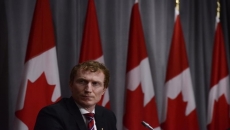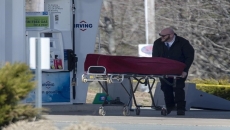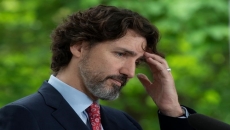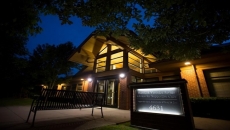Canadians are increasingly wearing protective face masks as they emerge from months of isolating at home to curb the spread of COVID-19, a new poll suggests.
And it suggests that fear of a second wave of infections as bad as or worse than the first wave may behind their increased caution.
Fifty-one per cent of respondents to the Leger and Association for Canadian Studies survey said they have worn masks to go grocery shopping — up eight percentage points in one week.
Forty-five per cent said they've worn masks to go to a pharmacy (up seven points), 17 per cent at work (up four points), 14 per cent on public transit (up four points) and 12 per cent to go for walks (up two points).
And 53 per cent — up two points — said masks should be mandatory in public and confined spaces, like shopping malls and public transit.
The online poll, conducted June 5 to 7, surveyed 1,523 adult Canadians; it cannot be assigned a margin of error because internet-based polls are not considered random samples.
The increased wearing of masks reflects the fact that restrictions on activities are slowly easing across the country, with more Canadians venturing out of their homes and going back to work.
But Leger executive vice-president Christian Bourque said it may also reflect fear of a second wave of the deadly coronavirus that causes COVID-19.
Seventy-six per cent of respondents said they expect a second wave will hit Canada. And 32 per cent said they expect a second wave that is stronger than the first, with another 40 per cent saying they expect it to be just as strong.
Bourque said that fear is also reflected in widespread support for a go-slow approach to reopening the country after three months of pandemic-induced lockdowns.
Two-thirds of respondents said governments should maintain the current, cautious pace of reopening, while another 21 per cent said they should slow down. Just 13 per cent wanted the pace sped up.
Fewer than 10 per cent supported reopening restaurants, hotels, gyms, bars, concert halls and theatres without any restrictions.
As long as safety precautions are in place, 68 per cent were comfortable seeing restaurants reopen, 67 per cent hotels, 55 per cent gyms or other fitness facilities and 50 per cent bars. But even with restrictions, just 44 per cent supported reopening concert halls and theatres, while 49 per cent were opposed.
"Canadians are being extremely prudent and careful about how they want us to go into sort of this exit strategy of Wave 1, probably because they fear Wave 2 is coming soon," said Bourque.
"By no means is this over in Canadians' minds ... Maybe it's just Canadians being Canadians, being careful about everything."
Fully 80 per cent of respondents said it's each Canadian's individual responsibility to try to prevent a second wave of the pandemic. Just 17 per cent put the responsibility on governments.
Still, 16 per cent of respondents said they don't intend to get an eventual vaccine against COVID-19, while another 16 per cent said they don't know if they will. Sixty-eight per cent said they would get vaccinated.
Bourque speculated that not all those who said they won't or might not get vaccinated are "anti-vaxxers." Some likely feel they are young and healthy and at little risk of falling seriously ill.






